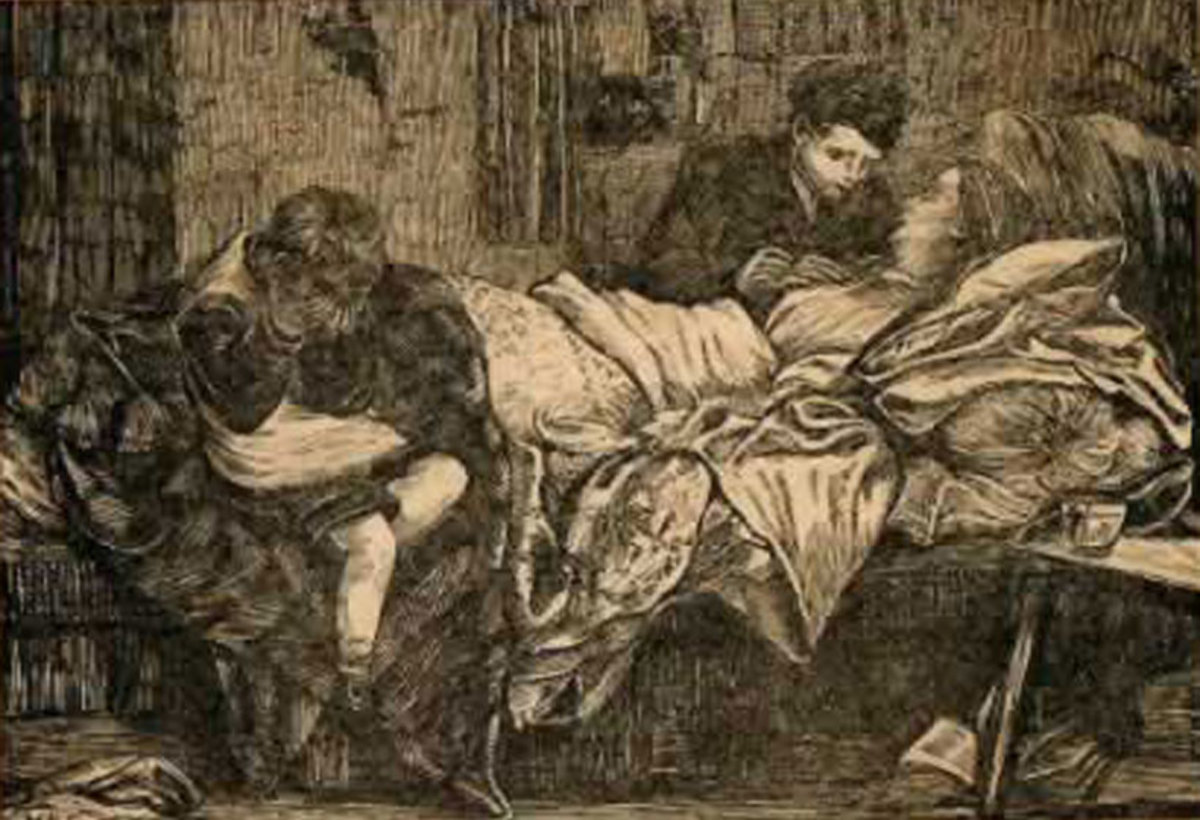Modernity Rising

The Growth of Modernity and the Progress of Tyranny
Well known are the deficiencies of Fascists and Communists - but what of other Modernists? Other more established Modernists (assorted plutocrats, imperialists, decadent artists, and progressives in Britain and France and America during the late 19th and early 20th centuries) are also deplorable.
Evidence these more established Atlantic Modernists are despicable:
Letter from Lord Clarendon to Lord Russell 1849
Surely this is a state of things to justify you asking the House of Commons for an advance. For I don't think there is another legislature in Europe that would disregard such suffering as now exists in the West of Ireland, or coldly persist in such a policy of extermination.
Social Statics by Herbert Spencer 1851
The poverty of the incapable, the distresses that come upon the imprudent, the starvation of the idle, and those shoulderings aside of the weak by the strong, which leave so many "in shallows and in miseries," are the decrees of a large, far-seeing benevolence.
The Catechism of Positive Religion by Auguste Comte 1852
Positivism only recognises duties, duties of all to all. Placing itself, as it does, at the social point of view, it cannot tolerate the notion of rights, for such notion rests on individualism.
See also: The Political Ideas of the Young Turks
On Liberty by John Stuart Mill 1859
For the same reason, we may leave out of consideration those backward states of society in which the race itself may be considered as in its nonage. The early difficulties in the way of spontaneous progress are so great, that there is seldom any choice of means for overcoming them; and a ruler full of the spirit of improvement is warranted in the use of any expedients that will attain an end, perhaps otherwise unattainable. Despotism is a legitimate mode of government in dealing with barbarians, provided the end be their improvement, and the means justified by actually effecting that end. Liberty, as a principle, has no application to any state of things anterior to the time when mankind have become capable of being improved by free and equal discussion.
Also: The History of British India by James Mill
This is another important era in the history of Hindu society; and having reached this stage, it does not appear that it has made, or that it is capable of making, much
further progress.
Lay Sermons, Addresses and Reviews by Thomas Huxley 1871
…no rational man, cognizant of the facts, believes that the average negro is the equal, still less the superior, of the average white man. And, if this be true, it is simply incredible [to assume] that, when all his disabilities are removed…he will be able to compete successfully with his bigger-brained and smaller-jawed rival, in a contest which is to be carried out by thoughts and not by bites. The highest places in the hierarchy of civilization will assuredly not be within the reach of our dusky cousins,
Agnosticism 1889
I know no study which is so unutterably saddening as that of the evolution of humanity, as it is set forth in the annals of history. Out of the darkness of prehistoric ages man emerges with the marks of his lowly origin strong upon him. He is a brute, only more intelligent than the other brutes, a blind prey to impulses, which as often as not lead him to destruction; a victim to endless illusions, which make his mental existence a terror and a burden, and fill his physical life with barren toil and battle.
Gentlemen, we must speak more loudly and more honestly! We must say openly that indeed the higher races have a right over the lower races
Socialism and Christianity by Adolphus Julius Frederick Behrends 1886
It is time that the poor and oppressed should understand that their deliverance will never come from the political economy which allies itself with the school of Haeckel and Darwin. It knows nothing of the duty of mercy, it recognizes only the right of the fittest to survive.
The Crowd: A Study of the Popular Mind Gustave Le Bon on atavistic racial urges1895
Environment, circumstances, and events represent the social suggestions of the moment. They may have a considerable influence, but this influence is always momentary if it be contrary to the suggestions of the race; that is, to those which are inherited by a nation from the entire series of its ancestors.
A History of the Warfare of Science with Theology in Christendom by Andrew Dickson White, cofounder of Cornell University 1896
In all modern history, interference with science in the supposed interest of religion, no matter how conscientious such interference may have been, has resulted in the direst evils both to religion and science, and invariably
See also: Beyond War and Peace: A Reappraisal of the Encounter between Christianity and Science
Science, Religion, and A. D. White: Seeking Peace in the “Warfare Between Science and Theology”
Heredity and Human Progress by William Duncan McKim 1900
But by what authority do we venture to destroy this wonderful thing, a human life? Our warrant is the example of nature... Let us look, then, to nature and see how she appears to regard life. If it be a thing intrinsically sacred she, no doubt, must handle it with full reverence. But such seems not her manner. She makes and unmakes life as if it were a mere accidental phenomenon met on her way to the accomplishment of some higher purpose.
The Souls of Black Folk by W.E.B. DuBois 1903
They forgot, too, just as their successors are forgetting, the rule of inequality:--that of the million black youth, some were fitted to know and some to dig;
See also: The Talented Tenth
Inquiries into Human Faculty and Its Development by Francis Galton 1907
...the yellow races of China, who have already made their industrial and social influence felt in many distant regions, and who bid fair hereafter, when certain of their peculiar religious fancies shall have fallen into decay, to become one of the most effective of the colonising nations, and who may, as I trust, extrude hereafter the coarse and lazy Negro from at least the metaliferous regions of tropical Africa.
E.A. Ross, Letter to Charles McCarthy1907
For my own part, I am entirely in favor of [compulsory sterilization]. The objections to it are essentially sentimental, and will not bear inspection. Sterilization is not nearly so terrible as hanging a man, and the chances of sterilizing the fit are not nearly so great, as are the chances of hanging the innocent. In introducing the policy, the wedge should have a very thin end indeed. Sterilization should at first be applied only to extreme cases, where the commitments and the record pile up to an overwhelming case. As the public become accustomed to it, and it is seen to be salutary and humane, it will be possible gradually to extend its scope until it fills its legitimate sphere of application.
DH Lawrence in a letter to Blanche Jennings 1908
If I had my way, I would build a lethal chamber as big as the Crystal Palace, with a military band playing softly, and a Cinematograph working brightly; then I’d go out in the back streets and main streets and bring them in, all the sick, the halt, and the maimed; I would lead them gently, and they would smile me a weary thanks; and the band would softly bubble out the ‘Hallelujah Chorus’.
See also: The Plumed Serpent
The Mores of the Present and the Future by William Graham Sumner 1909
the mores of the twentieth century will not be tinged by humanitarianism as those of the last hundred years have been
The Promise of American Life by Herbert Croly 1909
Unfortunately Jefferson's conception of democracy was meager, narrow, and self-contradictory; and just because his ideas prevailed, while Hamilton toward the end of his life lost his influence, the consequences of Jefferson's imperfect conception of democracy have been much more serious than the consequences of Hamilton's inadequate conception of American nationality. In Jefferson's mind democracy was tantamount to extreme individualism. He conceived a democratic society to be composed of a collection of individuals, fundamentally alike in their abilities and deserts; and in organizing such a society, politically, the prime object was to provide for the greatest satisfaction of its individual members. The good things of life which had formerly been monopolized by the privileged few, were now to be distributed among all the people. It was unnecessary, moreover, to make any very artful arrangements, in order to effect an equitable distribution. Such distribution would take care of itself, provided nobody enjoyed any special privileges and everybody had equal opportunities. Once these conditions were secured, the motto of a democratic government should simply be "Hands Off." There should be as little government as possible, because persistent governmental interference implied distrust in popular efficiency and good-will; and what government there was, should be so far as possible confided to local authorities. The vitality of a democracy resided in its extremities, and it would be diminished rather than increased by specialized or centralized guidance. Its individual members needed merely to be protected against privileges and to be let alone, whereafter the native goodness of human nature would accomplish the perfect consummation.
I admit freely enough that, by careful breeding, supervision of environment and education, extending over many generations, it might be possible to make an appreciable improvement in the stock of the American negro, for example, but I must maintain that this enterprise would be a ridiculous waste of energy, for there is a high-caste white stock ready to hand, and it is inconceivable that the negro stock, however carefully it might be nurtured, could ever even remotely approach it. The educated negro of to-day is a failure, not because he meets insuperable difficulties in life, but because he is a negro. His brain is not fitted for the higher forms of mental effort; his ideals, no matter how laboriously he is trained and sheltered, remain those of the clown. He is, in brief, a low-caste man, to the manner born, and he will remain inert and inefficient until fifty generations of him have lived in civilization. And even then, the superior white race will be fifty generations ahead of him.
Bertie Forbes described the secret meeting on Jekyll Island. 1910
Picture a party of the nation’s greatest bankers stealing out of New York on a private railroad car under cover of darkness, stealthily hieing hundred of miles South, embarking on a mysteriouslaunch, sneaking onto an island deserted by all but a few servants, living there a full week under such rigid secrecy that the names of not one of them was once mentioned lest the servants learn the identity and disclose to the world this strangest, most secret expedition in the history of American finance. I am not romancing; I am giving to the world, for the first time, the real story of how the famous Aldrich currency report, the foundation of our new currency system, was written.
See also: Has the Fed Been a Failure?
The Unparalleled Invasion by Jack London 1910
Had the reader again been in Peking, six weeks later, he would have looked in vain for the eleven million inhabitants. Some few of them he would have found, a few hundred thousand, perhaps, their carcasses festering in the houses and in the deserted streets, and piled high on the abandoned death-waggons. But for the rest he would have had to seek along the highways and byways of the Empire. And not all would he have found fleeing from plague-stricken Peking, for behind them, by hundreds of thousands of unburied corpses by the wayside, he could have marked their flight. And as it was with Peking, so it was with all the cities, towns, and villages of the Empire. The plague smote them all. Nor was it one plague, nor two plagues; it was a score of plagues. Every virulent form of infectious death stalked through the land. Too late the Chinese government apprehended the meaning of the colossal preparations, the marshalling of the world-hosts, the flights of the tin airships, and the rain of the tubes of glass. The proclamations of the government were vain. They could not stop the eleven million plague-stricken wretches, fleeing from the one city of Peking to spread disease through all the land. The physicians and health officers died at their posts; and death, the all- conqueror, rode over the decrees of the Emperor and Li Tang Fwung. It rode over them as well, for Li Tang Fwung died in the second week, and the Emperor, hidden away in the Summer Palace, died in the fourth week.
The Principles of Scientific Management by Frederick Winslow Taylor 1911
It is only through enforced standardization of methods, enforced adoption of the best implements and working conditions, and enforced cooperation that this faster work can be assured. And the duty of enforcing the adoption of standards and enforcing this cooperation rests with management alone.
Philip Dru: Administrator by Edward Mandell House 1912
In an address announcing his intentions towards Mexico and her allies, Dru said--“It is not our purpose to annex your country or any part of it, nor shall we demand any indemnity as the result of victory further than the payment of the actual cost of the war and the maintenance of the American troops while order is being restored. But in the future, our flag is to be your flag, and you are to be directly under the protection of the United States. It is our purpose to give to your people the benefits of the most enlightened educational system, so that they may become fitted for the responsibilities of self-government.

The Super Race; an American Problem by Scott Nearing 1912
Every well regulated state of antiquity eliminated defectives in the interest of the group, and of the future. What more effective means of social preservation could be imagined than some measure through whose operation the defective classes in society would be eliminated, and the social structure, bulwarked by stalwart manhood and womanhood, made proof against the ravages of time.
Intimate Papers of Colonel House Letter from Jacob Schiff to Colonel House 1913
My Dear Colonel House:
I want to say a word of appreciation to you for the silent, but no doubt effective work you have done in the interest of currency legislation and to congratulate you, that the measure has finally been enacted into law. We all know that an entirely perfect bill, satisfactory to everybody, would have been an impossibility and I feel quite certain fair men will admit that unless the President had stood as firm as he did, we would likely have had no legislation at all. The bill is a good one in many respects, anyhow good enough to start with and to let experience teach us in what directions it needs perfection, which in due time we shall then get. In any event you have personally good reasons to feel gratified with what has been accomplished, and trusting that this feeling may increase your holiday spirit,
I am with good wishes
Faithfully yours
Jacob W. Schiff
A Civic Biology: Presented in Problems by George William Hunter 1914 This textbook was at issue during the Scopes trial.
Parasitism and its Cost to Society. – Hundreds of families such as those described above exist to-day, spreading disease, immorality, and crime to all parts of this country. The cost to society of such families is very severe. Just as certain animals or plants become parasitic on other plants or animals, these families have become parasitic on society. They not only do harm to others by corrupting, stealing, or spreading disease, but they are actually protected and cared for by the state out of public money. Largely for them the poorhouse and the asylum exist. They take from society, but they give nothing in return. They are true parasites.
The Remedy. – If such people were lower animals, we would probably kill them off to prevent them from spreading. Humanity will not allow this, but we do have the remedy of separating the sexes in asylums or other places and in various ways preventing intermarriage and the possibilities of perpetuating such a low and degenerate race. Remedies of this sort have been tried successfully in Europe and are now meeting with success in this country.
The War That Will End War by H. G. Wells 1914
And, now this war is begun, we are resolved to put an end to militarism in the world for evermore.
The Pity Of War: Explaining World War I
Secretary of State William Jennings Bryan to President Woodrow Wilson 1914 War loans were later investigated by the Nye Committee.
I beg to communicate to you an important matter which has come before the Department. Morgan Company of New York have asked whether there would be any objection to their making a loan to the French Government and also the Rothschilds -- I suppose that is intended for the French Government. I have conferred with Mr. Lansing and he knows of no legal objection to financing this loan, but I have suggested to him the advisability of presenting to you an aspect of the case which is not legal but I believe to be consistent with our attitude in international matters. It is whether it would be advisable for this Government to take the position that it will not approve of any loan to a belligerent nation. The reasons that I would give in support of this proposition are:
First: Money is the worst of all contrabands because it commands everything else. The question of making loans contraband by international agreement has been discussed, but no action has been taken. I know of nothing that would do more to prevent war than an international agreement that neutral nations would not loan to belligerents. While such an agreement would be of great advantage, could we not by our example hasten the reaching of such an agreement? We are the one great nation which is not involved, and our refusal to loan to any belligerent would naturally tend to hasten a conclusion of the war. We are responsible for the use of our influence through example, and as we cannot tell what we can do until we try, the only way of testing our influence is to set the example and observe its effect. This is the fundamental reason in support of the suggestion submitted.
Second: There is a special and local reason, it seems to me, why this course would be advisable. Mr. Lansing observed in the discussion of the subject that a loan would be taken by those in sympathy with the country in whose behalf the loan was negotiated. If we approved of a loan to France we could not, of course, object to a loan to Great Britain, Germany, Russia, or to any other country, and if loans were made to these countries, our citizens would be divided into groups, each group loaning money to the country which it favors and this money could not be furnished without expressions of sympathy. These expressions of sympathy are disturbing enough when they do not rest upon pecuniary interests -- they would be still more disturbing if each group was pecuniarily interested in the success of the nation to whom its members had loaned money.
Third: The powerful financial interests which would be connected with these loans would be tempted to use their influence through the newspapers to support the interests of the Government to which they had loaned because the value of the security would be directly affected by the result of the war. We would thus find our newspapers violently arrayed on one side or the other, each paper supporting a financial group and pecuniary interest, All of this influence would make it all the more difficult for us to maintain neutrality as our action on various questions that would arise would affect one side or the other and powerful financial interests would be thrown into the balance.... As we cannot prevent American citizens going abroad at their own risk, so we cannot prevent dollars going abroad at the risk of the owners, but the influence of the Government is used to prevent American citizens from doing this. Would the Government not be justified in using its influence against the enlistment of the nation's dollars in a foreign war?
Letter Winston Churchill sent to Walter Runciman, the president of Britain’s Board of Trade 1915
It is most important to attract neutral shipping to our shores in the hope especially of embroiling the United States with Germany . . . . For our part we want the traffic — the more the better; and if some of it gets into trouble, better still.
Dead Wake: The Last Crossing of the Lusitania
Pope Benedict XV's Peace Proposal 1917
We have never ceased to urge the belligerent peoples and Governments to become brothers once more, even although publicity has not been given to all which We have done to attain this most noble end.
What Are We Fighting For? by John Dewey 1918
In short, the war, by throwing into relief the public aspect of every social enterprise, has discovered the amount of sabotage which habitually goes on in manipulating property rights to take a private profit out of social needs. Otherwise, the wrench needed in order to bring privately controlled industries into line with public needs would not have had to be so great.
Applied Eugenics by Paul Popenoe 1918
The doctrine of personal liberty, in this extreme form, was enunciated and is maintained by people who are ignorant of biology and evolution; people who are ignorant of the world as it is, and deal only with the world as they think it ought to be. Nature reveals no such extreme "law of personal liberty," and the race that tries to carry such a supposed law to its logical conclusion will soon find, in the supreme test of competition with other races, that the interests of the individual are much less important to nature than the interests of the race. Perpetuation of the race is the first end to be sought. So far as according a wide measure of personal liberty to its members will compass that end, the personal liberty doctrine is a good one; but if it is held as a metaphysical dogma, to deny that the race may take any action necessary in its own interest, at the expense of the individual, this dogma becomes suicidal.
Supreme Court decision case Schenk v. United States by Oliver Wendell Holmes Jr. 1919
The question in every case is whether the words used are used in such circumstances and are of such a nature as to create a clear and present danger that they will bring about the substantive evils that Congress has a right to prevent. It is a question of proximity and degree. When a nation is at war, many things that might be said in time of peace are such a hindrance to its effort that their utterance will not be endured so long as men fight, and that no Court could regard them as protected by any constitutional right.
Mr. Baruch: Yes, sir; it did. I probably had more power than perhaps any other man did in the war; doubtless that is true.
How We Advertised America by George Creel 1920
While America's summons was answered without question by the citizenship as a whole, it is to be remembered that during the three and a half years of our neutrality the land had been torn by a thousand divisive prejudices, stunned by the voices of anger and confusion, and muddled by the pull and haul of opposed interests. These were conditions that could not be permitted to endure. What we had to have was no mere surface unity, but a passionate belief in the justice of America's cause that should weld the people of the United States into one white-hot mass instinct with fraternity, devotion, courage, and deathless determination. The war-will, the will-to-win, of a democracy depends upon the degree to which each one of all the people of that democracy can concentrate and consecrate body and soul and spirit in the supreme effort of service and sacrifice. What had to be driven home was that all business was the nation's business and every task a common task for a single purpose.

The Engineers and the Price System by Thorstein Veblen 1921
In short, so far as regards the technical requirements of the case the situation is ready for a self-selected, but inclusive, Soviet of technicians to take over the economic affairs of the country and to allow and disallow what they may agree on; provided always that they live within the requirements of that state of the industrial arts whose keepers they are, and provided their pretensions continue to have the support of the of the industrial rank and file;
Eugenics and Other Evils by G. K. Chesterton 1922
We now pass from mere individual men who obviously cannot be trusted, even if they are individual medical men, with such despotism over their neighbours; and we come to consider whether the Eugenists have at all clearly traced any more imaginable public authority, any apparatus of great experts or great examinations to which such risks of tyranny could be trusted. They are not very precise about this either; indeed, the great difficulty I have throughout in considering what are the Eugenist's proposals is that they do not seem to know themselves.
The Revolt against Civilization; the Menace of the Under Man by Lothrop Stoddard 1922
The idea of “Natural Equality” is one of the most pernicious delusions that has ever afflicted mankind. It is a figment of the human imagination. Nature knows no equality. The most cursory examination of natural phenomena reveals the presence of a Law of Inequality as universal and inflexible as the Law of Gravitation. The evolution of life is the most striking instance of this fundamental truth. Evolution is a process of differentiation – of increasing differentiation – from the simple one-celled bit of protoplasm to the infinitely differentiated, complex life forms of the present day.
The Pivot of Civilization by Margaret Sanger 1922
But there is a special type of philanthropy or benevolence, now widely advertised and advocated, both as a federal program and as worthy of private endowment, which strikes me as being more insidiously injurious than any other. This concerns itself directly with the function of maternity, and aims to supply GRATIS medical and nursing facilities to slum mothers. Such women are to be visited by nurses and to receive instruction in the "hygiene of pregnancy"; to be guided in making arrangements for confinements; to be invited to come to the doctor's clinics for examination and supervision. They are, we are informed, to "receive adequate care during pregnancy, at confinement, and for one month afterward." Thus are mothers and babies to be saved. "Childbearing is to be made safe." The work of the maternity centers in the various American cities in which they have already been established and in which they are supported by private contributions and endowment, it is hardly necessary to point out, is carried on among the poor and more docile sections of the city, among mothers least able, through poverty and ignorance, to afford the care and attention necessary for successful maternity. Now, as the findings of Tredgold and Karl Pearson and the British Eugenists so conclusively show, and as the infant mortality reports so thoroughly substantiate, a high rate of fecundity is always associated with the direst poverty, irresponsibility, mental defect, feeble-mindedness, and other transmissible taints. The effect of maternity endowments and maternity centers supported by private philanthropy would have, perhaps already have had, exactly the most dysgenic tendency. The new government program would facilitate the function of maternity among the very classes in which the absolute necessity is to discourage it.
Public Opinion by Walter Lippmann 1922
That the manufacture of consent is capable of great refinements no one, I think, denies. The process by which public opinions arise is certainly no less intricate than it has appeared in these pages, and the opportunities for manipulation open to anyone who understands the process are plain enough.
The creation of consent is not a new art. It is a very old one which was supposed to have died out with the appearance of democracy. But it has not died out. It has, in fact, improved enormously in technic, because it is now based on analysis rather than on rule of thumb. And so, as a result of psychological research, coupled with the modern means of communication, the practice of democracy has turned a corner. A revolution is taking place, infinitely more significant than any shifting of economic power.
Within the life of the generation now in control of affairs, persuasion has become a self-conscious art and a regular organ of popular government. None of us begins to understand the consequences, but it is no daring prophecy to say that the knowledge of how to create consent will alter every political calculation and modify every political premise. Under the impact of propaganda, not necessarily in the sinister meaning of the word alone, the old constants of our thinking have become variables. It is no longer possible, for example, to believe in the original dogma of democracy; that the knowledge needed for the management of human affairs comes up spontaneously from the human heart. Where we act on that theory we expose ourselves to self-deception, and to forms of persuasion that we cannot verify. It has been demonstrated that we cannot rely upon intuition, conscience, or the accidents of casual opinion if we are to deal with the world beyond our reach.
ICARUS or The Future of Science by Bertrand Russell 1924
Before long, birth-control may become nearly universal among the white races; it will then not deteriorate their quality, but only diminish their numbers, at a time when uncivilized races are still prolific and are preserved from a high death-rate by white science.
This situation will lead to a tendency --- already shown by the French --- to employ more prolific races as mercenaries. Governments will oppose the teaching of birth-control among Africans, for fear of losing recruits. The result will be an immense numerical inferiority of the white races, leading probably to their extermination in a mutiny of mercenaries. If, however, a world-government is established, it may see the desirability of making subject races also less prolific, and may permit mankind to solve the population question. This is another reason for desiring a world-government.
William Jennings Bryan's summation of the Scopes trial (distributed to reporters but not read in court) 1925
Science is a magnificent force, but it is not a teacher of morals. It can perfect machinery, but it adds no moral restraints to protect society from the misuse of the machine. It can also build gigantic intellectual ships, but it constructs no moral rudders for the control of storm-tossed human vessel. It not only fails to supply the spiritual element needed but some of its unproven hypotheses rob the ship of its compass and thus endanger its cargo. In war, science has proven itself an evil genius; it has made war more terrible than it ever was before. Man used to be content to slaughter his fellowmen on a single plane, the earth's surface. Science has taught him to go down into the water and shoot up from below and to go up into the clouds and shoot down from above, thus making the battlefield three times as bloody as it was before; but science does not teach brotherly love. Science has made war so hellish that civilization was about to commit suicide; and now we are told that newly discovered instruments of destruction will make the cruelties of the late war seem trivial in comparison with the cruelties of wars that may come in the future. If civilization is to be saved from the wreckage threatened by intelligence not consecrated by love, it must be saved by the moral code of the meek and lowly Nazarene. His teachings, and His teachings alone, can solve the problems that vex the heart and perplex the world.
The end of laissez-faire by John Maynard Keynes 1926
The time has already come when each country needs a considered national policy about what size of population, whether larger or smaller than at present or the same, is most expedient. And having settled this policy, we must take steps to carry it into operation. The time may arrive a little later when the community as a whole must pay attention to the innate quality as well as to the mere numbers of its future members.
Supreme Court decision Buck v. Bell by Oliver Wendell Holmes Jr. 1927 Brandeis and the other justices but one concurred. See also: "The Jukes": A Study in Crime, Pauperism, Disease and Heredity by Richard L. Dugdale 1877
We have seen more than once that the public welfare may call upon the best citizens for their lives. It would be strange if it could not call upon those who already sap the strength of the State for these lesser sacrifices, often not felt to be such by those concerned, in order to prevent our being swamped with incompetence. It is better for all the world if, instead of waiting to execute degenerate offspring for crime or to let them starve for their imbecility, society can prevent those who are manifestly unfit from continuing their kind. The principle that sustains compulsory vaccination is broad enough to cover cutting the Fallopian tubes. Jacobson v. Massachusetts,197 U.S. 11. Three generations of imbeciles are enough.
See also: Three Generations, No Imbeciles
If It Die… An Autobiography by Andre Gide 1935 Gide and Wilde and E.M. Forster too went in for sex tourism. They all preyed on non-European boys.
Wilde took a key out of his pocket and showed me into a tiny apartment of two rooms, where we were soon joined by the vile guide. The two youths followed him, each of them wrapped in a burnous that hid his face. Then the guide left us and Wilde sent me into the further room with little Mohammed and shut himself up in the other with the darbouka player.
See also: The Immoralist
Great Britain, the Jews and Palestine by Samuel Landman 1936
that the best and perhaps the only way (which proved so. to be) to induce the American President to come into the War was to secure the co-operation of Zionist Jews by promising them Palestine, and thus enlist and mobilise the hitherto unsuspectedly powerful forces of Zionist Jews in America and elsewhere in favour of the Allies on a quid pro quo contract basis. Thus, as will be seen, the Zionists, having carried out their part, and greatly helped to bring America in, the Balfour Declaration of 1917 was but the public confirmation of the necessarily secret "gentleman's" agreement of 1916
America Must Show the Way! Technocracy Inc. 1938
In a power age of high energy consumption and rapid social and industrial change, democratic ideals and methods have demonstrated themselves to be inadequate. Few individuals, no matter how competent they may be in their own fields, are able to comprehend the intricate and complex problems of our nation today, much less pass accurate judgment upon them.
In the midst of increasing mechanization and technological organization, propaganda is simply the means used to prevent these things from being felt as too oppressive and to persuade man to submit with good grace. When man will be fully adapted to this technological society, when he will end by obeying with enthusiasm, convinced of the excellence of what he is forced to do, the constraint of the organization will no longer be felt by him; the truth is, it will no longer be a constraint, and the police will have nothing to do. The civic and technological good will and the enthusiasm for the right social myths — both created by propaganda — will finally have solved the problem of man. – Propaganda: The Formation of Men's Attitudes by Jacques Ellul
intellectuals are most easily reached by propaganda, particularly if it employs ambiguity. The reader of a number of newspapers expressing diverse attitudes — just because he is better informed — is more subjected than anyone else to a propaganda that he cannot perceive, even though he claims to retain free choice in the mastery of all this information. – Propaganda: The Formation of Men's Attitudes by Jacques Ellul
Jules Ferry, free-thinker to his fingertips. He believed that the young of France must be drawn away from the darkening influence of the clergy and brought to light by state schools. That would be no small work since so many of the schools were run by Catholic religious orders. He brought in a bill to make it illegal for any member of a religious order to teach in a school if the order had not government approval. At that moment there were some 500 convents and 20,000 monks and nuns who were teaching French children and had no approval from the State. Ferry said he would close all the Jesuit houses, because they must prise the soul of French youth from the Jesuits who were essentially alien to France. The press of the French right called Ferry a Nero. – A History of the Popes, 1830-1914 by Owen Chadwick
Understandably Darwinism was seized upon as a welcome addition, perhaps the most powerful of all, to the store of ideas to which solid and conservative men appealed when they wished to reconcile their fellows to some of the hardships of life and to prevail upon them not to support hasty and ill-considered reforms. – Social Darwinism in American Thought by Richard Hofstadter
Seligman’s presidential address confidently predicted that the new economics, like a natural science, would understand economic forces so well it would “control them and mould them to ever higher uses.” As mentioned earlier, Seligman’s confidence was sufficient for him to portray economists – only barely established as professionals – as the creators of the future, the philosophers of social life who deserved the deferential gratitude of the American people. – Illiberal Reformers by Thomas C. Leonard
The new universities threw off the cleric-dominated classics curriculum of traditional American college instruction and adopted the investigatory spirit and methods of the modern German universities. They offered more practical courses, notably political economy. – Illiberal Reformers by Thomas C. Leonard p. 19
"We never believed Wilson when he said he would keep us out of war," he later said. "We were convinced we were going to get into the war." – Walter Lippman and the American Century by Ronald Steel p. 107
Not only did Lippman help swing the New Republic behind Wilson, he wrote speeches for the President and even delivered campaign talks in upstate New York from the back of a trailer truck. – Walter Lippman and the American Century by Ronald Steel p. 107
Reluctant to admit that the failure to foresee an unjust peace might have been as much his fault as Wilson's, he preferred to see it as an administration problem. – Walter Lippman and the American Century by Ronald Steel p. 161
"We've got no business taking part in unauthorized civil war in Russia" – Walter Lippman and the American Century by Ronald Steel p. 164
Hatred of socialism had him bowing to an inevitable Darwinian arms race 20 years before the Great War. – Huxley From Devil's Disciple to Evolution's High Priest by Adrian Desmond p. 636
So let’s condemn all forms of Modernism: the various self-serving ideologies imposed by predatory anti-Christian elites.
Early Modernism - Enlightenment, Enlightened Autocrats, French Revolution, Napoleon
Middle Modernism - plutocrats, imperialists, decadent artists, and progressives
Late Modernism - Marxism, Leninism, Stalinism, Maoism & Fascism, Nazism
Modernism still exists as an unsightly stain found in certain backward communities (bloated corporations and heavily subsidized university liberal art departments for example).
Middle Modernism encompasses both right and left, predators disguised and undisguised, bankers and celebrities, 4-eyed technocrats and savage warriors, affluence which results in decadence and decadence which results in dictatorship.
Anti-Christians:
- They can reject Jesus' teachings of kindness and forgiveness.
- The bleak atheist faith is unpopular. To maintain their privileges atheist elites must attack the theist majority.
- Materialists believe humans are just sacks of chemicals. If so reduced, why do we possess value or rights?
What do materialists think of man?
We are machines with gears and springs, insects controlled by instinct. Our thoughts are just sticky secretions of the brain. We are only accidents, strangers in a universe without a plan. We kill time by observing the pointless & ceaseless tumble of particles.
American technocrats: They urge us to discard foggy sentimental illusions and instead look to the hard facts as explained by experts and engineers. The mawkish and murky masses, the unevolved and unfit, the superstitious religious simpletons will blather on about rights and equality and democracy and try to hold back progress, but we must fight them and serve our (always entirely disinterested) scientific saviors. Release the brake on these masterminds, these wonder workers, these brilliant bureaucrats and we’ll surge into the future. The backwoods boobs and unhygienic nonwhite peoples should be thankful if they are allowed to exist at all! Really these affronts to efficiency, these imbeciles should be ridiculed and sterilized and bombed and gassed as often as possible - eliminated entirely. Then we’ll watch as our superior superman soar ever upwards.
More reading:
MR. DISRAELI AND THE BULGARIAN "ATROCITIES." 1876
The Turkish Atrocities In Bulgaria
The "affaire des fiches" Elite discrimination
Opposition to Irish independence from Tyndall
The Metaphysical Club: Two Views
Technocracy and the American Dream: The Technocrat Movement, 1900-1941
How Ayn Rand Became an American Icon
Woman's Christian Temperance Union Early History Meanwhile the men of the Third Republic refused to extend the vote to women because they were too traditional.
World War I's Pope Benedict XV and the pursuit of peace
Progressivism and imperialism: The progressive movement and American foreign policy, 1898-1916
Looking Backward by Edward Bellamy 1887
The Origins of Totalitarianism by Hannah Arendt
The Social Meaning of Modern Biology by Howard L. Kaye
The Age of Atheists by Peter Watson
The Progressive History of Eugenics
The Eugenics Movement Britain Wants to Forget
Rothbard: World War I as the Triumph of Progressive Intellectuals
Meet America’s first drug dealer: Arnold Rothstein’s wild, real-life 1920s “Sopranos” story
World War I Propaganda Posters
Laissez-Faire Social Darwinism and Individualist Competition in Darwin and Huxley










